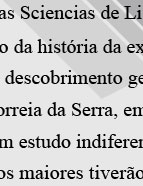

................................
The diligent translator Oliveira Ramos decided to complete the work with “Notas em apêndice ao volume da “Historia da época dos descobrimentos” de Sophus Ruge” ["Notes appended to the volume of Sophus Ruge's "History of the Discoveries"]. Once again he felt a synthesis of the history of the discipline was necessary, where the solution to two difficulties needed to be found: the national biases and the geographical secrecy that obscured the documentation. This author understood perfectly well the need to relieve the "heroes" of the burden imposed on them, to highlight what had been achieved "through the effort, and through the skill of the poor seamen, who are part of the immense legion of those ‘left out' of the great epics of the golden centuries" (S. Ruge, Idem, undated, p. 485). Seeking as it were to clean all the excrescences that had accumulated, in the discovery or rediscovery of Madeira, the voyage to the Canary Islands and the arrival in the Azores.
Expeditions in the 14th century were rare and non-sequential. He also dismissed (Afastando também) part of Prince Henry’s legend and discussed the purpose of reaching India by sea. Additionally, he gave attention to the Northwest passage by the Corte-Real brothers, the conflicts among the governors of India, David Melgueiro's attempt to cross the Northeast and the southwestern voyage of Fernão de Magalhães. The voyages of Christopher Columbus were also worthy of particular attention. And his substantial notes culminate in an inquiry into the penetrations of the Portuguese in Africa, America, and Asia which, of course, was still part of the colonising interests of the time. A history of the Portuguese discoveries was thus outlined, with excellent critical judgment, although it was still a preparatory synthesis of a larger, never-to-be-pursued work. It should be noted that Professor Oliveira Ramos paid special attention to cartography, naturally so, given his military background. In fact, he always referred to the discoveries from a geographical viewpoint.
The beginning of the 20th century was a historiographical period marked by great erudition: this was the period of publications in the Archivo Historico Portuguez [Portuguese Historical Archive] directed by Anselmo Braamcamp Freire. It was also the period when the publications of Joaquim Bensaúde were particularly prominent, with L'astronomie nautique au Portugal à l'époque des grandes découvertes and Histoire de la science nautique portugaise à l'époque des grandes découvertes (1912 and 1921 respectively), and the publications of Luciano Pereira da Silva with A astronomia dos Lusíadas [The astronomy of the Lusiads], among other texts.
